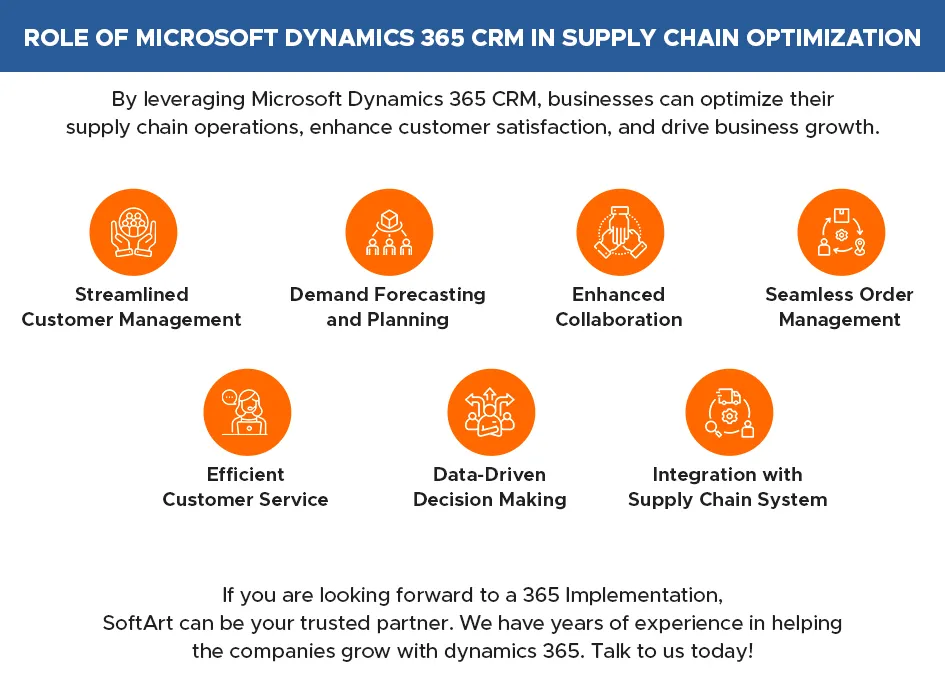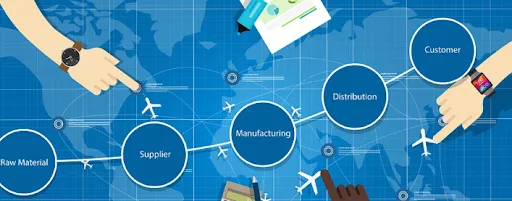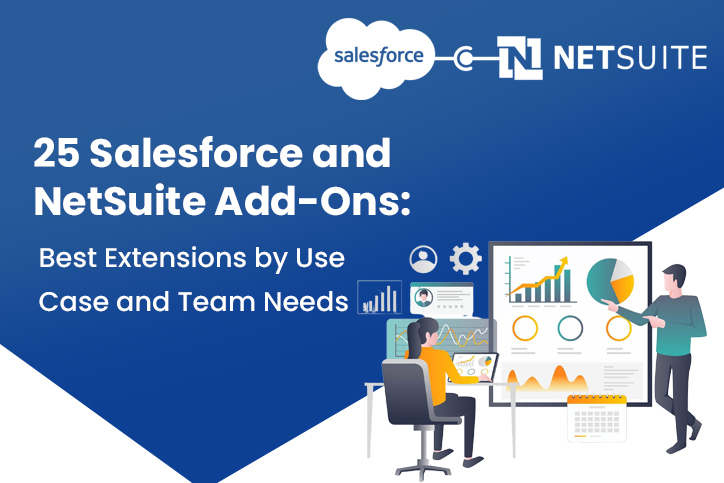Did you know that companies with superior supply chain capabilities outperform their peers with a 3-to-1 revenue growth advantage? Well, they definitely have a major advantage over the businesses that have not yet switched to automation.
Since everything is being automated, it goes without saying that it’s time to leverage the power of Dynamics 365 and revolutionize your supply chain processes.
Imagine having real-time visibility into your inventory levels, efficient warehouse management, accurate demand forecasting, streamlined procurement, and seamless integration across your entire supply chain. With Microsoft Dynamics 365 CRM for Supply Chain Management, you can turn this into an actionable reality. This comprehensive solution from Microsoft empowers businesses to optimize their supply chain operations, reduce costs, and exceed customer expectations.
Let’s explore the remarkable features and capabilities of this solution that can transform the way you manage your inventory, logistics, production, and procurement.
What is Supply Chain Optimization?
Before we delve into the intricacies of Dynamics 365 Supply Chain Management, let’s pause for a moment and understand what supply chain optimization really is. Simply put, supply chain optimization is the process of making the best use of resources in a supply chain to achieve maximum efficiency and effectiveness. It’s about leveraging data, technology, and human resources to streamline processes, reduce costs, and improve customer satisfaction.
But why, you might ask, is it so important to optimize your supply chain operations? And that’s exactly where we’re heading next!
Importance of Optimizing Supply Chain Operations
In the competitive business environment, optimizing your supply chain operations is no longer a luxury; it’s a necessity. It’s the backbone of your business, the lifeline that connects your product from inception to delivery.
An optimized supply chain can reduce your lead times, lower your inventory costs, and improve your customer service. It’s an essential aspect of your business strategy that can significantly influence your bottom line. But how do you go about optimizing your supply chain operations? That’s where Dynamics 365 Supply Chain Management comes in.
Understanding Dynamics 365 as a Supply Chain Optimization Tool
Imagine having a tool at your disposal that’s tailor-made to optimize your supply chain operations. That’s exactly what Dynamics 365 Supply Chain Management is. Developed by Microsoft, it’s a comprehensive solution that brings together all aspects of your supply chain into one unified platform.
By harnessing the power of artificial intelligence (AI) and machine learning (ML), it offers real-time insights into your operations, helping you make informed decisions. Whether it’s inventory management, order processing, or demand forecasting, Dynamics 365 Supply Chain Management has got you covered.
Features of Dynamics 365 Supply Chain Management
Dynamics 365 Supply Chain Management is a comprehensive solution offered by Microsoft for streamlining and optimizing supply chain operations. It combines various functionalities and features to help businesses manage their inventory, logistics, procurement, production, and demand forecasting processes. Here are some key features of Dynamics 365 Supply Chain Management:
Inventory Management
The system provides real-time visibility into inventory levels, locations, and movement. It enables businesses to optimize inventory levels, reduce carrying costs, and avoid stockouts by automating replenishment processes.
Warehouse Management
Dynamics 365 Supply Chain Management offers features for efficient warehouse management, including advanced picking and packing, put-away strategies, wave processing, cross-docking, and cycle counting. It helps improve order fulfillment accuracy and speed.
Demand Forecasting and Planning
The solution utilizes historical data, statistical algorithms, and machine learning techniques to generate accurate demand forecasts. It helps businesses optimize their production planning, inventory levels, and procurement activities to meet customer demand while minimizing excess stock.
Procurement and Vendor Management
The system supports end-to-end procurement processes, including supplier selection, negotiation, purchase order management, and vendor performance tracking. It enables businesses to streamline procurement operations, reduce costs, and improve supplier relationships.
Production Control and Planning
Dynamics 365 Supply Chain Management offers tools for managing production orders, capacity planning, scheduling, and shop floor operations. It helps optimize production efficiency, improve resource utilization, and ensure on-time delivery.
Transportation Management
The solution includes features for managing transportation operations, such as carrier selection, routing optimization, shipment tracking, and freight cost management. It helps businesses optimize their logistics processes, reduce transportation costs, and improve delivery performance.
Quality Control
The system supports quality control processes by enabling businesses to define quality standards, perform inspections, manage non-conformances, and track product quality across the supply chain. It helps ensure product compliance and customer satisfaction.
Analytics and Reporting
Dynamics 365 Supply Chain Management provides robust analytics and reporting capabilities to gain insights into supply chain performance, identify bottlenecks, and make data-driven decisions. It offers customizable dashboards, pre-built reports, and integration with Microsoft Power BI for advanced analytics.
Integration and Collaboration
The solution integrates with other business systems, such as ERP, CRM, and financial management applications, to enable seamless data flow and end-to-end process automation. It also supports collaboration and information sharing among supply chain stakeholders.

How Dynamics 365 Implementation Partner Can Help Streamline Your Supply Chain?
A Dynamics 365 implementation partner can play a crucial role in streamlining your supply chain by leveraging their expertise and experience in deploying the Dynamics 365 Supply Chain Management solution. Here are several ways in which a Dynamics 365 implementation partner can help:
Requirement Analysis
An implementation partner will work closely with your organization to understand your unique supply chain requirements. They will conduct a thorough analysis of your existing processes, identify pain points, and determine how Dynamics 365 can be tailored to address your specific needs.
Solution Design and Configuration
Based on the requirements analysis, the implementation partner will design a solution architecture that aligns with your supply chain goals. They will configure Dynamics 365 to match your business processes, including defining inventory models, warehouse layouts, procurement rules, demand forecasting parameters, and more.
Data Migration
The implementation partner will assist in migrating your existing supply chain data, such as inventory, vendors, customers, and historical transactions, into Dynamics 365. They will ensure data integrity and completeness during the migration process to enable a smooth transition.
Customization and Integration
Depending on your unique requirements, the implementation partner can customize Dynamics 365 by developing additional functionalities or integrating with other systems, such as ERP, CRM, or third-party logistics providers. This allows for seamless data exchange and process automation across different systems.
Training and Change Management
An implementation partner will provide comprehensive training to your staff on how to effectively use Dynamics 365 Supply Chain Management. They will ensure that your team understands the system’s features and functionalities and can leverage them to optimize supply chain processes. Additionally, they can assist with change management initiatives to facilitate a smooth transition for your employees.
Process Optimization
With their expertise in supply chain management and Dynamics 365, the implementation partner can help identify opportunities for process improvement and optimization. They will work closely with your team to streamline workflows, eliminate bottlenecks, and implement best practices within the solution.
Ongoing Support and Maintenance
After the initial implementation, the partner can provide ongoing support and maintenance services to ensure the smooth functioning of Dynamics 365 Supply Chain Management. They will address any issues, perform system upgrades, and provide assistance for continuous improvement and optimization.
Continuous Improvement and Upgrades
A Dynamics 365 implementation partner stays up-to-date with the latest advancements and updates in the platform. They can provide guidance on leveraging new features and functionalities to further streamline your supply chain as your business evolves.
Conclusion: Maximizing Business Growth with Dynamics 365 Supply Chain Management
In conclusion, Dynamics 365 Supply Chain Management is not just a tool; it’s a strategic asset that can propel your business to new heights. By optimizing your supply chain operations, it can enhance operational efficiency, reduce costs, and improve customer satisfaction, ultimately driving business growth.
So, if you are ready to unleash the power of Dynamics 365 Supply Chain Management, it’s time to connect with the experts of Dynamics 365 consulting at SoftArt. With 20 years of experience, our excellence in supply chain optimization with D365 is unparalleled. We have helped various companies in streamlining their processes for better growth and profitability. Get in touch with us today to know more about our services.
FAQs
Q1: Can Dynamics 365 Supply Chain Management help with demand forecasting?
Yes, Dynamics 365 leverages historical data, statistical algorithms, and machine learning techniques to generate accurate demand forecasts. This helps businesses optimize production planning, inventory levels, and procurement activities to meet customer demand while minimizing excess stock.
Q2: How does Dynamics 365 enhance collaboration in the supply chain?
D365 facilitates collaboration by enabling teams to share real-time information, such as sales forecasts, inventory levels, and customer feedback. This improves coordination, decision-making, and reduces lead times.
Q3: Can Dynamics 365 CRM integrate with other supply chain systems?
Dynamics 365 CRM seamlessly integrates with other supply chain systems, such as ERP and logistics platforms, allowing for the exchange of data and automation of processes across the entire supply chain ecosystem. This improves visibility and enhances overall efficiency.
Q4: Does Dynamics 365 Supply Chain Management support procurement activities?
Yes, Dynamics 365 supports end-to-end procurement processes, including supplier selection, negotiation, purchase order management, and vendor performance tracking. This streamlines procurement operations, reduces costs, and strengthens supplier relationships.








